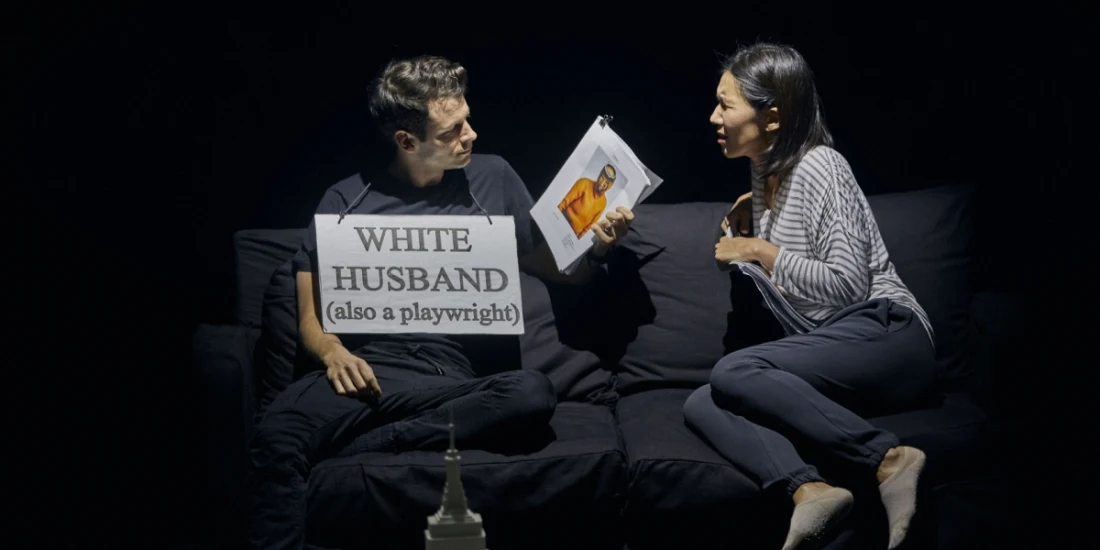Review of Endlings at New York Theatre Workshop
Three elderly haenyeos (female deep sea divers), on a small island in the Korean Peninsula, make a living by diving daily into the sea to harvest seafood and shellfish. They chat in a well-honed rapport about their absent families, their impossible dreams, and hassle of aging. They are endlings: The last of a dying breed of independent, iron-willed matriarchs that has long since fallen to industrialization. But Han Sol, Go Min, and Sook-Ja carry on, rather swimming than crawling unburthened towards death.
It's not that simple. It never is. Enter Ha Young, a Korean-Canadian Manhattanite in her late 20s, an unsubtle proxy for playwright Celine Song. In a long-standing tradition of Asian playwrights thinking out loud onstage, Ha Young grapples with the challenge of writing authentically in an inevitably white-dominated space.
"I don't want to sell my skin for theatre / I don't want to sell my skin for a piece of real estate / So I've been writing white plays / I've been writing white plays for years"
Real estate looms leeringly over this play. Ha Young, a child of immigrants, recounts how generations of women in her family cyclically uprooted their lives and, abandoning everything, went to become "penniless strangers in better real estate." In the present day, Ha Young's life is dominated by the oppressive upkeep of Manhattan real estate, paralleling her struggles as a playwright; to carve out a piece of real estate for her work, free from the white gaze and the white attention that it otherwise would so desperately need for success. "So good / it's great / I love it," says her White Husband after reading the play. His propitiating tone betrays a lack of understanding that will no doubt be echoed by many in the largely white, affluent, and elderly audience at New York Theatre Workshop. Song is entirely conscious of this.
Juggling turtle pimps and keen POC sensitivities, Song penned Endlings to be richly complex and all-encompassing, rivaling the metaphors even in similar works playing across town. Thanks to director Sammi Cannold's bold and investigative eye, and stellar, authentic performances by the entire cast, it also makes sense. The production also features an ambitiously aquatic set from Jason Sherwood, costumes by Linda Cho, and Bradley King's colorful lights that have become a subtle trademark of his collaboration with Cannold.
There's a beautiful moment when the haenyeos' love of the ocean is compared to Ha Young's love of the theatre. Both are primal, consumptive forces to which the respective parties have proudly devoted their lives. But at the end of the day, both desire a common freedom within their craft. Both just want to exist.
"There is no real estate under the sea / But sometimes I think about the space my body occupies"
(Photo by Chad Batka)
WHAT THE OTHER CRITICS SAID
"The design team — especially Jason Sherwood (sets) and Linda Cho (costumes) — gives us haunting underwater vignettes involving a giant turtle and declaiming clams. The haenyeos swim by as if exhibits in an aquarium. Pretty as this may be, it takes us further from the facts of both stories; Song's frantic attempts to hustle between them eventually give the play a bad case of the dramaturgical bends. That's a shame, because the haenyeos, whose traditional role at the center of a matriarchal society goes unexplored, could have been more than prompts for a personal essay. As it is, they are mostly a subject in search of a theme — a theme the playwright never convincingly harvests from a sea that does not easily give up its treasures."
Jesse Green for New York Times
"The ostensible subject of Endlings, Celine Song's deconstructed new play, are elderly women native to a small island off the South Korean coast, where for centuries such women—known as haenyeo—have plunged into the ocean to gather seafood. But these divers turn out to be red herrings for the bigger fish that Song is out to fry: herself, her creative process, and the systems supporting this very play (including the theater in which it's being presented). Although the result is less than cohesive, Endlings is a bold and revealing act of autofiction by a playwright actively wrestling with her identity as an artist."
Naveen Kumar for Time Out New York
"Endlings is a work of great self-deprecation. Song's old divers are as arresting as her young playwright is silly (when she's supposed to be irreverent)."
Robert Hofler for The Wrap
Originally published on
